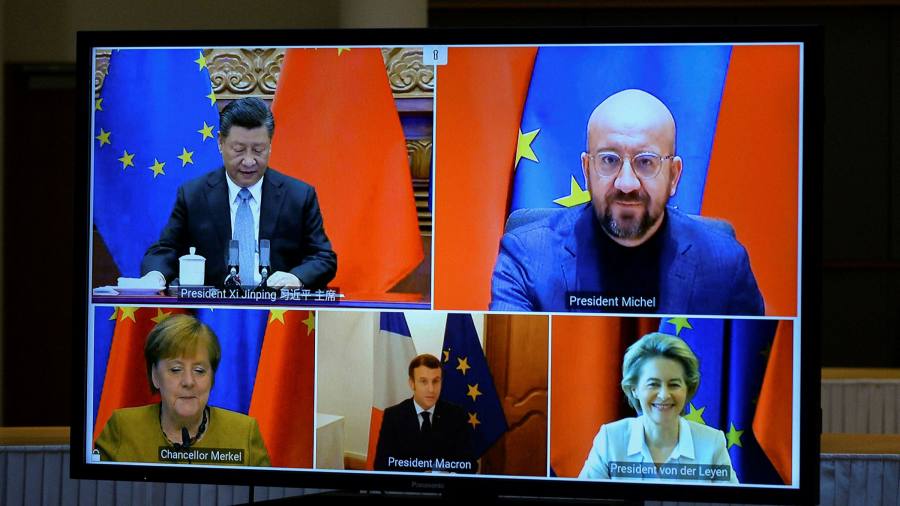[ad_1]
The EU is poised to trigger its first sanctions on China since the arms embargo imposed after the 1989 Tiananmen Square massacre — and Beijing is not happy about it.
Official China-affiliated sources have issued a flurry of threats of retaliation over the measures, which are expected to be approved by EU foreign ministers on Monday.
The EU action itself will be modest: travel bans and asset freezes against four Chinese officials and one entity over the mass persecution of Uyghur Muslims in the Xinjiang region, diplomats said. But it is a striking development in the EU’s increasingly complex relations with China, coming straight after Beijing’s representatives clashed with their Washington counterparts in Alaska last week.
The EU measures are part of a range of sanctions foreign ministers are likely to impose against several countries at their regular meeting in Brussels. It’s an effort to showcase the bloc’s new regime to deal with rights abuses as Michelle Bachelet, UN human rights chief, joins the EU representatives for an “informal exchangeâ€.
The move is also a sign of strains in the European bloc’s multipronged approach to China. The two sides’ last high-profile encounter was one of mutual congratulation over a long-awaited investment agreement signed in December.
The temperature could hardly be more different three months on. Beijing is already formulating countermeasures against EU institutions, while individuals in EU countries who have “behaved badly†will “not escape punishmentâ€, warned China’s state-controlled tabloid Global Times.
The promised tit-for-tat will take place against a backdrop of efforts by President Joe Biden’s administration to mobilise international allies against China’s influence. This month saw the first summit of the “Quadâ€, a partnership between the US, Japan, India and Australia to counter Beijing’s power in the Indo-Pacific region.
The push from Washington also raises pressure on the EU to make decisions on how to proceed with regard to China in the face of its own conflicts.
On the one hand, there is reluctance in Europe to cut off business opportunities or join anything that could be perceived as a global anti-China alliance. On the other, there is an increasing hardening of attitudes towards Beijing in areas such as cyber security, the crackdown in Hong Kong and alleged espionage and influence operations in the EU.
Neither EU sanctions nor any Chinese reaction is likely to be a game-changer on bilateral ties. But the clash and the growing US pressure suggest a reckoning on Europe’s relationship with Beijing cannot be delayed forever.
Chart du jour: third wave damage

Economists are cutting growth forecasts for the eurozone economy as a third wave of Covid-19 infections and vaccination delays spurred tighter restrictions in several countries, including France, Italy and Germany. A return to pre-pandemic output levels is now not expected before next year. The FT’s Martin Arnold has more. (chart via FT)
Europe news round-up

-
Boris Johnson will urge EU leaders this week to pull back from a full-scale “vaccine war†after the bloc rejected London’s claims to millions of doses of Oxford/AstraZeneca Covid-19 jabs produced at a Dutch factory. Read more here about the intrigue around the Halix plant in the Leiden Bio Science Park that is at the centre of the cross-Channel dispute. (FT)
-
The ex-chief of staff to former Malta premier Joseph Muscat appeared in court at the weekend on money laundering, fraud and corruption charges, police said. Keith Schembri pleaded not guilty, according to court officials. The case relates to a business deal in which Daphne Caruana Galizia, the journalist murdered in a 2017 car bombing, had alleged money laundering. Schembri has denied involvement in the murder and has not been charged in relation to it. Yorgen Fenech, a businessman and associate of Schembri, has pleaded not guilty to masterminding Caruana Galizia’s killing and is awaiting trial. (Reuters)
-
Turkey’s currency has tumbled as much as 14 per cent after President Recep Tayyip Erdogan sacked the country’s central bank chief, Naci Agbal, who had been regarded as a crucial force in pulling the lira from historic lows. (FT)
-
Britain and the EU are poised to agree a new “talking shop†for co-operation on financial services, but the deal will still leave the City of London facing barriers to trade with the 27-member bloc. (FT)
Coming up this week
Foreign ministers hold talks on Monday, with Turkey and the EU’s southern neighbourhood on the agenda as well as sanctions. Also on Monday, financial services commissioner Mairead McGuinness will meet Bank of England governor Andrew Bailey.
The Agriculture and Fisheries Council convenes on Monday and Tuesday. European affairs ministers hold an informal video conference on Tuesday.
Nato foreign ministers gather on Tuesday and Wednesday in a first outing at alliance headquarters for US secretary of state Antony Blinken. He is also due to meet European Commission president Ursula von der Leyen, foreign policy chief Josep Borrell and Belgian deputy prime minister and foreign minister Sophie Wilmès.
EU leaders meet by videoconference on Thursday and Friday, with a euro summit also scheduled for Friday.
[ad_2]
Source link






